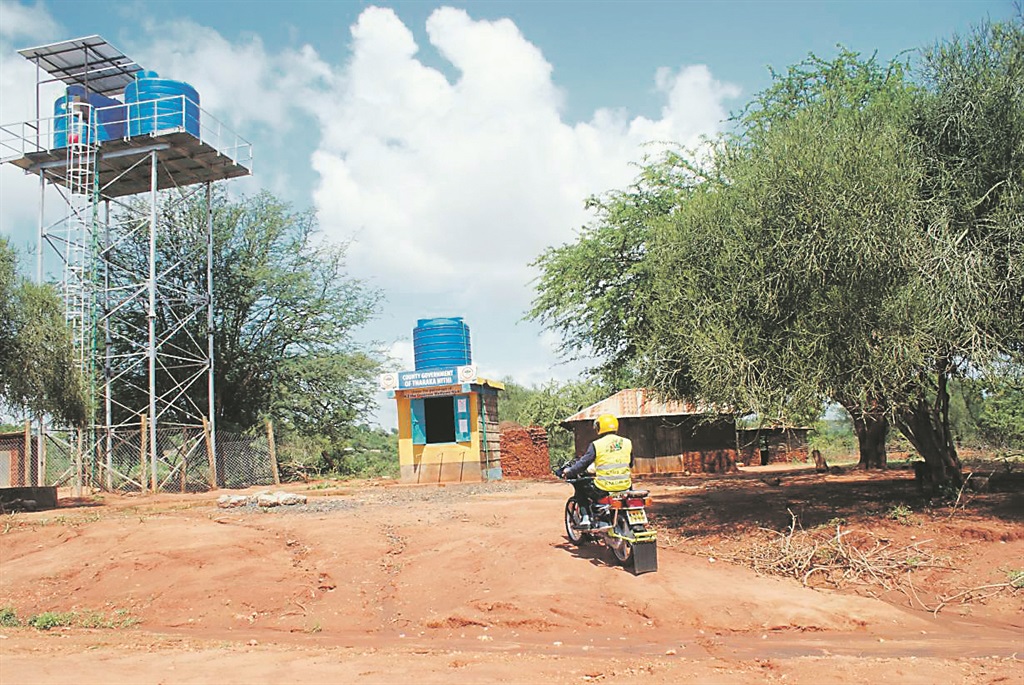
Stooped over the knee-high rows of mung beans she’s growing in eastern Kenya, Grace Kaari hums to herself as she removes weeds with a blunt machete.
Two years ago, Kaari would not have had time to tend to her crop in the morning. Instead, she would have been travelling to gather water from a river 12km away.
“I used to spend the whole day fetching water. I could not do anything else during the day because I was so tired,” she said.
But a recently installed solar-powered water pump has brought the precious resource directly to her village of Marimanti in Tharaka-Nithi County. And, with the village water storage tanks full, she has time for the endless number of tasks that require her attention on her 4 000m2 piece of land.
Access to clean water remains a struggle for many of rural Kenya’s poorest households, with families blaming the problem on everything from a lack of infrastructure to a lack of government commitment to help the country’s most marginalised people.
But areas like Tharaka-Nithi, where there is little if any infrastructure to supply households with electricity, are now tapping into solar energy to pump water to villages from nearby rivers.
The water is then directed into storage tanks in the village, making it accessible to the people who live there. And it’s free.
Jasper Nkanya, Tharaka-Nithi County’s executive commissioner for agriculture, water, irrigation and fisheries, said: “People have been struggling with water scarcity, yet this county has three permanent rivers. The challenge was to tap water from the sources and bring it nearer homes.”
Nkanya said the county has plenty of sunshine, a resource that went untapped for years.
“The solar units are able to absorb energy, which can be used to pump water during the day and at night” using a battery system, he said.
Established at a cost of $80 000 (R1.1 million), the solar pump project, which serves more than 40 000 people, is funded by the county government, Nkanya said.
Residents say easier access to water has made a difference in their lives, particularly to those of women and girls, who are traditionally charged with gathering the vital resource.
Martin Mwiti, a motorbike taxi operator in Marimanti, said: “My daughter used to miss school because she accompanied her mother to fetch water. Now, her performance has improved because she is always at school.”
GAME-CHANGER
Nkanya said that, when more funds became available, government hoped to expand the project to other parts of the county that faced similar water security problems.
Another 14 Kenyan counties are also seeing solar power put in place to boost development as part of a World Bank-funded effort, said Joseph Njoroge, the Kenyan energy department’s principal secretary.
“The aim is to use solar energy to bring development in marginalised parts of Kenya, including access to water, lighting and heating,” Njoroge said of the $150 million project, which was launched in 2017.
Mbeo Ogeya, an African research fellow at the Stockholm Environment Institute, said the use of solar power to fuel water pumping and irrigation “can be a game-changer in energy and food security for marginalised parts of Kenya”.
In Marimanti, the impact of access to solar-pumped water is already visible as modern homes are gradually replacing thatched huts in the area, long one of the poorest in Kenya, as easier access to water spurs the creation of new businesses.
John Kibaara, a resident in Marimanti, said health centres now had enough stored water to ensure good hygiene when babies were being delivered, while children no longer had to spend time fetching water instead of attending school.
Njoroge predicts that the use of solar power will proliferate in Kenya.
“We are looking at the potential we have; looking ahead and counting on renewable energy to supply our energy needs. This will reduce energy costs and spur the growth of micro and medium-sized enterprises, especially in rural areas,” he said.– Thomson Reuters Foundation




 Publications
Publications
 Partners
Partners








